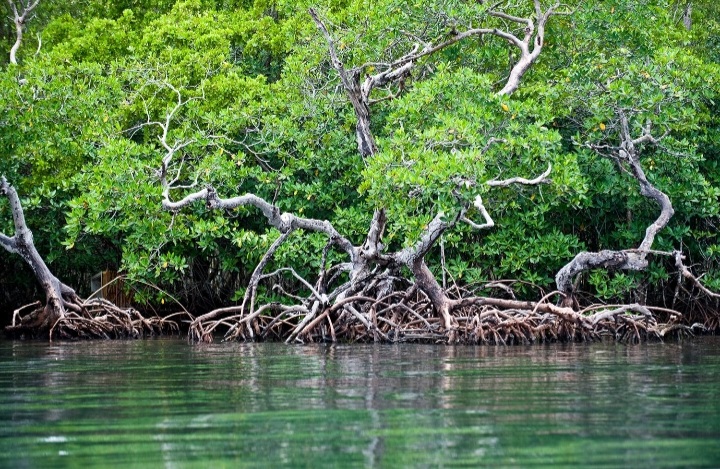Utilizing mangrove for ecosystems restoration

By Obiabin Onukwugha
Mangroves play significant role in restoring polluted ecosystems. In Ogoni, Niger Delta, there have been ongoing efforts to restore mangroves destroyed by series of oil spills as recommended by the United Nations Environmental Programme (UNEP)
Mangroves provide natural infrastructure to help protect nearby populated areas by reducing erosion and absorbing storm surge impacts during extreme weather events such as hurricanes.
They are also important to the ecosystem too. Their dense roots help bind and build soils. Besides, mangroves provide a breeding ground and habitation for sea life. When mangroves are destroyed, the flora and fauna are lost, thereby exposing sea species to harsh weathers that could lead to their death or migration.
However, there are warnings that planting the wrong species of mangroves could be counted productive and harmful to the ecosystem.
The warning was handed down by experts who say planting random species of trees has resulted in reduced environmental benefits since a big percentage of the mangroves fail to survive. According to the experts, planting certain mangroves species in the wrong areas is harming local ecosystems.
An expert and Wetlands International East Africa Director Julie Mulonga, in a report by Kenyan media, Nation, emphasised the need for Kenya to reassess its approaches in mangrove restoration.
She also cautioned against indiscriminate mass planting, revealing that the survival rate for such efforts is only 30 to 32 per cent.
“We have realised that mass planting of mangroves does not help because most of the trees eventually die. For example, if you plant 10,000 mangroves, the survival rate is 30 to 32 per cent,” she was qioted as saying..
Ms Mulonga said there should be a shift towards natural restoration, which may take time but offers higher survival rates.
On his part, the Kenya Marine and Fisheries Research Institute (KMFRI) Chief Research Scientist, Dr James Kairo, called for the use of effective mangrove restoration approaches that are science-based.
According to Dr Kairo, restoration of mangroves can only be done through a community based approach, where locals participate in the planting of seedlings. He added that similar species of mangroves should be planted in the same area.
He noted that mixed species of mangroves cannot be planted in the same area since planting different species in one area may disrupt their growth.
He added that those planting the trees should ensure that sites are protected from human activities as well as livestock, and that proper monitoring is done for not less than five years.
He was speaking in Kwale County during the national mangrove dialogue, which was held ahead of the International Day of Conservation of Mangroves in Tsunza Village.
He said the challenge of planting the wrong species in the wrong places and planting in sites which mangroves cannot tolerate led to the preparation of the National Mangrove Ecosystem Restoration guidelines, a framework that will boost conservation of the trees by improving their survival rate.
In recent years, Kenya has seen a surge of awareness on conservation of marine ecosystems, particularly mangrove forests, which play a crucial role in in preserving a healthy and sustainable environment..
This growing awareness has spurred increased involvement of experts, companies and local communities, who have planted thousands of seedlings to restore mangrove forests in coastal region – Kwale, Lamu, Tana River, Kilifi and Mombasa counties.
Kenya’s mangrove forests cover 61,271 hectares. They play a significant role in climate change mitigation by storing huge volumes of carbon that would otherwise evaporate and heat up the planet, among other benefits.
However, the scientists and experts have raised concerns about the continuous restoration efforts that do not adhere to established guidelines, saying they are undermining the success and positive impact of the mangroves.
